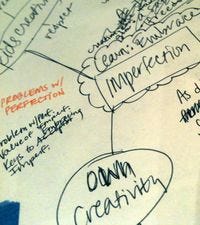Learn: Embrace Imperfection
As part of a series of recent posts on fostering creativity in children, I outlined the requirements of an environment that nurtures creativity:
A safe space
True creative freedom
Respect
In order to maintain an environment that encourages creativity, in order to maintain awareness of our responses to creativity, we must embrace imperfection: because mistakes play a vital role in creative process.
The Problem with Perfection
In researching creativity in children, I learned how expectations can stunt creativity. Journalist Alina Tugend, in her book Better by Mistake, describes how perfectionism can stand as an obstacle. Problems with perfectionism arise when:
a mistake is perceived as a crisis
a project sits incomplete for fear of failure or because it's not "perfect"
self-improvement gets trampled along a path toward a must-have outcome
self-improvement gets stifled because goals don’t extend beyond perceived abilities
unrealistically high goals lead to a sense of failure instead of building skills and confidence
The Value of Imperfection
Embracing imperfection doesn't mean lowering our standards. Embracing imperfection means recognizing that imperfection happens and appreciating the value imperfection offers.
Mistakes serve to help children develop healthy self-esteem and resiliency, writes Tugend.
Imperfection gives us courage, compassion and connection, explains Brené Brown, PhD, LMSW in her book The Gifts of Imperfection. These gifts contribute to living a full, meaningful, authentic life.
"Our creative process has shown us," writes improviser and corporate speaker John Sweeney in his book Innovation at the Speed of Laughter, "… that most 'mistakes' lead to the next unexpected innovation, the next great idea."
Keys to Embracing Imperfection
Embracing imperfection, like many new perspectives, takes practice and awareness. To walk through life with imperfection as your friend, try to:
focus on efforts and de-emphasize results
take risks and accept challenges
remain aware of stereotypes and society's "contradictory message that it's all right to make mistakes but not where it counts," advises Tugend
avoid evaluating mistakes as "good" or "bad"
avoid comparing ourselves, our possessions and our actions to others
though not all ideas are worthy of follow-through, accept all ideas when they arise rather than dismissing an idea before it's had a chance to grow wings
Imperfection can serve as a springboard for creativity and innovation. When you try on a mindset of imperfection, you might be surprised by how your child's or your own innovation, ideas and creativity can blossom. Where can you see the value of imperfection in your own life? Leave a comment or send me a tweet.
If you liked this post, you might also enjoy Learn: Letting Go of Expectations


